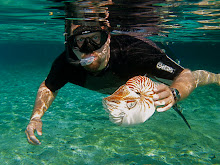 |
| Risbecia tryoni |
Some of the more spectacular creatures to observe while
snorkeling at Raja Ampat are the numerous
nudibranchs, or sea slugs. Tucked among the many sponges, soft corals, and colorful
tunicates these gaudy, ornamented animals are tiny visual jewels. In Raja Ampat these slugs, because they are so abundant, seem much easier to spot than in many other marine areas. And like everything else in Raja, there is great diversity allowing you to see at least one new flamboyant species with each different snorkel site visited.
Nudibranchs are so colorful for a variety of reasons, to warn predators and to fool them, for camouflage, and because some have toxins which can taste bad to predators. Many can incorporate stinging cells from the anemones they eat, while others hijack the poisons from the sponges that they ingest. Thankfully for the snorkeler we are most interested in locating, observing, and photographing them so simply th fact that they ARE extremely colorful makes for a bit of an underwater treasure hunt when trying to locate these small (most are less than 3-inches) critters. Below are photos showing some of the slugs we encountered on the most recent Oceanic Society snorkel trip to Raja Ampat in Oct/Nov of 2011.
 |
| Nembrotha cristata | | | |
 |
| Chromodoris annae |
 |
| Elysia ornata |
 |
| Halgerda batangas |
 |
| Caloria indica |
 |
| Phyllidia ocellata |
 |
| Nembrotha chamberlaini |
 |
| Chelidonura varians |
 |
| Chromodoris coi - laying eggs |
 |
| Flabellina exopata |
 |
| Nembrotha kubaryana |
There are some terrific sites on the web to learn about nudibranchs and see detailed pictures of them and many other marine animals for id'ing your photographic finds. I have listed some of my favorite below. Here is link for a
great book for id'ing Nudibranchs.
MarineLifePhotography - Keoki & Yuko Stender
Secret Sea Visions - Burt Jones & Maurine Shimlock
Sea Slugs of Hawaii - Cory Pittman & Pauline Fiene
Underwater Photography Guide - Nudibranchs
















No comments:
Post a Comment